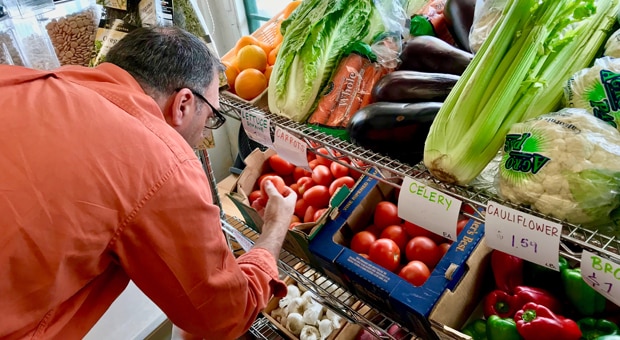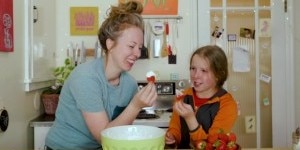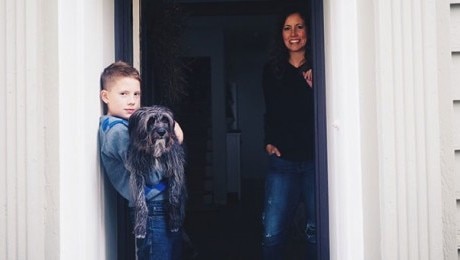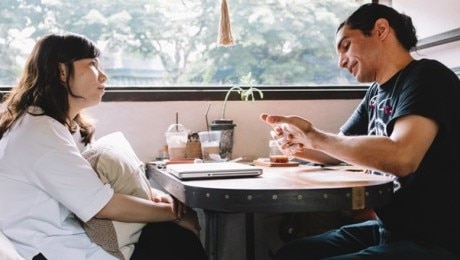
all
Family Health
My Family’s History of Early Death Is Driving Me to Make Changes for My Daughters
By Joseph Wilson
Photo © TonyTheTigersSon/Twenty20
Oct 10, 2019
My father had his first heart attack at the age of 36. He had a pacemaker by 40.
Even though my diet is decent and my blood pressure is low, genetics are not on my side on this one. Recently I was diagnosed with high cholesterol. It actually wasn’t very high but, as the doctor put it, raising his eyebrows, “with your family history….”
Read another story about life, death and parenting by Joseph Wilson: We’re All Going To Die — Conversations With A 5-Year-Old, 7-Year-Old And A Squirrel Named Eli
The ellipses at the end of that sentence kept me up at night. So I changed my diet, categorically: No more red meat or cold-cuts. Rarely: fries, chicken. Often: fish, beans, avocado, nuts. And it worked; my "good" cholesterol climbed and my "bad" cholesterol fell. Still, my family doctor suggested I consider preventative medication.
I demurred, so he referred me to a cardiologist at Toronto Western Hospital.
The fifth floor of the Toronto Western Hospital was the place where my father recovered from his first heart attack. Also from his second heart attack, his third heart attack, his triple bypass operation and his pacemaker installation. It was not a place of good vibes, and I was there for an aptly-named "stress test."
So I changed my diet, categorically: No more red meat or cold-cuts.
As a child I can remember gauging my father’s level of anxiety by how far he was from his next test at the hospital. The goal is to run on a treadmill for as long as you possibly can as the treadmill keeps getting steeper and faster. It’s like an anxiety dream come to life.
They placed electrodes all over my chest and wired me up, tape and saran wrap holding it all together. I could see a thin line tracing out the form of my heartbeat on the monitor. Then the treadmill began. It was like trying to run in a cyborg costume.
When I got home, I told my kids where I had been.
“I was at the hospital today,” I said, as casually as I could.
“Are you sick?” asked Sonia (she’s eight).
“No. It’s more to check to see if my heart is strong.”
“Ba-boom, ba-boom,” said Maria (3).
“Is it?” asked Sonia.
“I don’t have the results yet. But probably. I’m in good shape. But grandad wasn’t. His heart was weak because he smoked and ate bad food.”
“Yuck,” said Elizabeth (6).
“Yeah, yuck. But we eat well. I’m trying to change my diet. That’s why we eat a lot of fish.”
“I hate fish,” said Sonia.
None of my girls ever met their grandad. He died when our first born was four days old.
“OK, but it might keep me alive longer. What else should I do?”
“Exercise!” said Sonia.
“Sure. That’s one of the reasons we don’t have a car, so we have to walk and bike more.”
Elizabeth sighed. “I love the car,” she said.
None of my girls ever met their grandad. He died when our first born was four days old. The fact that mortality is so far removed from their minds at this age is such a gift. I want them to retain that innocence for as long as possible. I changed the subject.
“Want to see the parts of my chest they shaved for the test?” I said lifting my shirt.
The response was unanimous: “Ewww!”
Want to start the conversation of death with books? Here's some reading material: 9 Books To Help Kids Understand Death
Dinner-time conversations are one of the things I remember most fondly from my own childhood, and now I’m doing the same with my family.
We make each other laugh, or gross each other out, and it’s something I hope to keep doing with my own grandkids one day.
Which is why, whether my kids like it or not, we have these conversations, more often than not, over a plate of fish.
Most Popular
-
 Ages:
Ages:
allLearning
I Want My Kids to Feel Sad
-
 Ages:
Ages:
allStories
Why I Didn’t Invite Anyone to the Birth of My Child
-
 Ages:
Ages:
allBreakfasts
How To Make The Perfect Pancake
-
 Ages:
Ages:
allStories
What I Wish My Parents Had Said When I Came Out As Gay
-
 Ages:
Ages:
allStories
I’m Trying To Save My Daughter From Being A VSCO Girl
















 Halloween
Halloween



































Add New Comment
To encourage thoughtful and respectful conversations, first and last names will appear with each submission to CBC/Radio-Canada's online communities (except in children and youth-oriented communities). Pseudonyms will no longer be permitted.
By submitting a comment, you accept that CBC has the right to reproduce and publish that comment in whole or in part, in any manner CBC chooses. Please note that CBC does not endorse the opinions expressed in comments. Comments on this story are moderated according to our Submission Guidelines. Comments are welcome while open. We reserve the right to close comments at any time.
Submission Policy
Note: The CBC does not necessarily endorse any of the views posted. By submitting your comments, you acknowledge that CBC has the right to reproduce, broadcast and publicize those comments or any part thereof in any manner whatsoever. Please note that comments are moderated and published according to our submission guidelines.